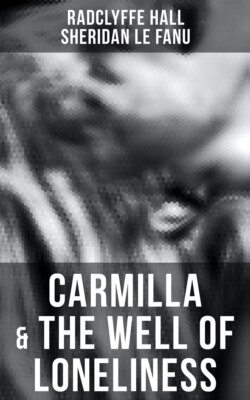Читать книгу Carmilla & The Well of Loneliness - Radclyffe Hall - Страница 13
На сайте Литреса книга снята с продажи.
4
ОглавлениеIn these days Stephen clung more closely to her father, and this in a way was because of Collins. She could not have told you why it should be so, she only felt that it was. Sir Philip and his daughter would walk on the hillsides, in and out of the blackthorn and young green bracken; they would walk hand in hand with a deep sense of friendship, with a deep sense of mutual understanding.
Sir Philip knew all about wild flowers and berries, and the ways of young foxes and rabbits and such people. There were many rare birds, too, on the hills near Malvern, and these he would point out to Stephen. He taught her the simpler laws of nature, which, though simple, had always filled him with wonder: the law of the sap as it flowed through the branches, the law of the wind that came stirring the sap, the law of bird life and the building of nests, the law of the cuckoo’s varying call, which in June changed to ‘Cuckoo-kook!’ He taught out of love for both subject and pupil, and while he thus taught he watched Stephen.
Sometimes, when the child’s heart would feel full past bearing, she must tell him her problems in small, stumbling phrases. Tell him how much she longed to be different, longed to be some one like Nelson.
She would say: ‘Do you think that I could be a man, supposing I thought very hard—or prayed, Father?’
Then Sir Philip would smile and tease her a little, and would tell her that one day she would want pretty frocks, and his teasing was always excessively gentle, so that it hurt not at all.
But at times he would study his daughter gravely, with his strong, cleft chin tightly cupped in his hand. He would watch her at play with the dogs in the garden, watch the curious suggestion of strength in her movements, the long line of her limbs—she was tall for her age—and the poise of her head on her over-broad shoulders. Then perhaps he would frown and become lost in thought, or perhaps he might suddenly call her:
‘Stephen, come here!’
She would go to him gladly, waiting expectant for what he should say; but as likely as not he would just hold her to him for a moment, and then let go of her abruptly. Getting up he would turn to the house and his study, to spend all the rest of that day with his books.
A queer mixture, Sir Philip, part sportsman, part student. He had one of the finest libraries in England, and just lately he had taken to reading half the night, which had not hitherto been his custom. Alone in that grave-looking, quiet study, he would unlock a drawer in his ample desk, and would get out a slim volume recently acquired, and would read and re-read it in the silence. The author was a German, Karl Heinrich Ulrichs, and reading, Sir Philip’s eyes would grow puzzled; then groping for a pencil he would make little notes all along the immaculate margins. Sometimes he would jump up and pace the room quickly, pausing now and again to stare at a picture—the portrait of Stephen painted with her mother, by Millais, the previous year. He would notice the gracious beauty of Anna, so perfect a thing, so completely reassuring; and then that indefinable quality in Stephen that made her look wrong in the clothes she was wearing, as though she and they had no right to each other, but above all no right to Anna. After a while he would steal up to bed, being painfully careful to tread very softly, fearful of waking his wife who might question: ‘Philip darling, it’s so late—what have you been reading?’ He would not want to answer, he would not want to tell her; that was why he must tread very softly.
The next morning, he would be very tender to Anna—but even more tender to Stephen.
